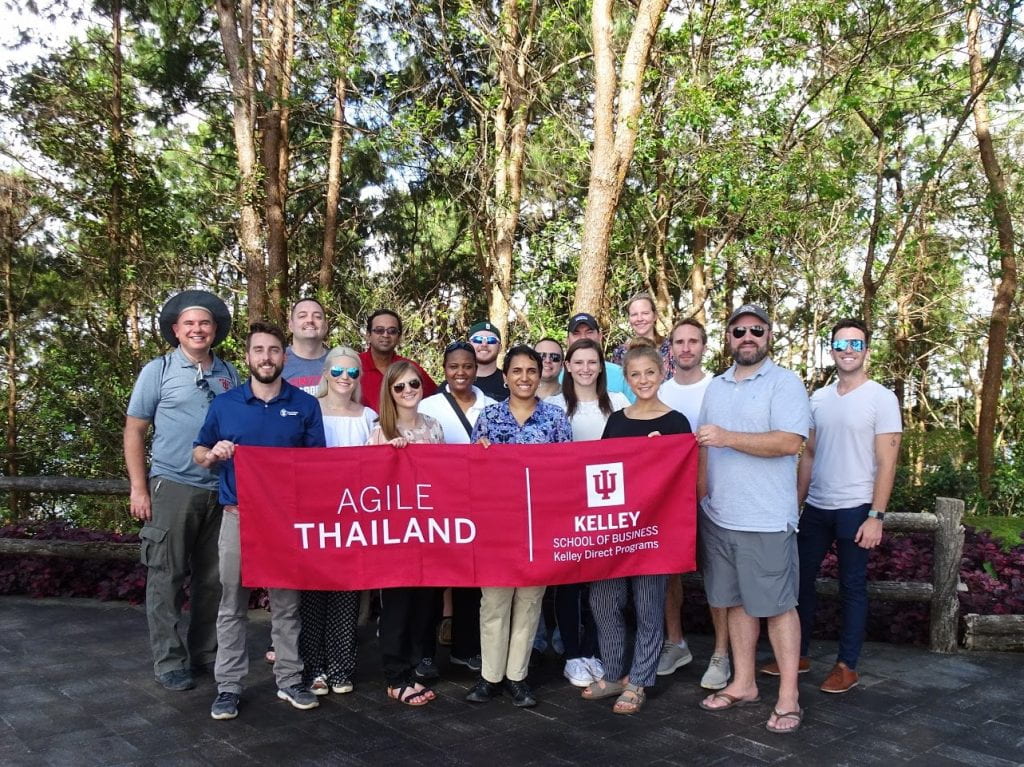Alex Lopes is the Clinical Professor and Grant Thornton Scholar. He currently teaches online technology courses including S596 (Digital Technology and Innovation) in the Kelley Direct MBA core as well as T514 (Business Capabilities for the Digital Future) and T501 (Big Data Technologies) as electives.
What is the most rewarding aspect of your job?
There are two things that I consider most rewarding. First, I get paid to be curious! I love to understand how technology changes lives and business, and I always try to bring to class the latest and greatest technologies and their roles in how organizations do business. Second, I have always looked for roles where I can mentor students and I really enjoy spending time with people discussing their careers and how technology may affect their paths.
What can students expect from your Kelley Direct courses?
Very updated content is one thing that I always bring to my technology courses. I maintain a database of resources that I use in my classes containing everything I learn about different areas of technology. Every week I add a couple of items to that database and these resources end up showing up in my courses all the time as I refresh the content frequently. The other main attribute of my courses is that they are rigorous and challenging, and I am very proud of the reputation of being a demanding instructor, always pushing students to do their best.
How has COVID pushed you to teach in new ways?
Interestingly enough, COVID has had a very limited effect on my online technology classes and even in my residential classes. Many of my residential courses are flipped, following the same model I use in the KD program (videos in advance, work during live classes). So, dealing with COVID was not a major issue from a class structure perspective. Obviously, COVID has affected many people in different ways and I always tell my students that family is the most important thing we all have. So, if something happens to one of my students or their families, there is an additional bias in being flexible during these COVID days. That was always the case, but COVID has brought the necessity to be flexible to the forefront.

How do you find work-life balance? What do you tell your students how best to manage their time to be successful?
I tried to be super-organized all the time so my Outlook schedule kind of rules my life. However, every week I reserve the spots for my family and personal activities first (such as taking kids to their activities or reserving some time to play tennis). Only after that is done, I start scheduling meetings and allocating time to course development and other work activities. Otherwise, it is just too easy to keep working all the time, and that is something I want to avoid. Good time management goes a long way to make life less stressful, as long as it also includes time to relax.
How do you keep students engaged in an online classroom?
I very rarely have lectures in my live classes. I have recorded many videos over the years that students can watch prior to class so that we can do work during class time. Together with Will Geoghegan and others, I introduced shared workspaces in my online classes in Kelley Direct. Those have become great resources for students to discuss cases and scenarios during the live classes. When I am teaching a more technical course, we use class time for students to work on problems or models. I think this is an ideal approach for everybody to learn by doing.
What do you tell your students if/when they ask about accelerating their career?
I know this is going to look super-biased but I always tell my students that a good understanding of technology will help them propel their careers. If they are in their earlier stages, I always recommend that people learn how to code. If they are more in the mid- or senior-level, I tell them to follow technology trends from an application perspective and try to understand how technological advances can be applied to their organizations and industries. Leading digital transformation initiatives is certainly a way to move forward.
What is something people may not understand about online learning?
It can be as rewarding, challenging, and social as in-residence learning. Class design is very important but the willingness of people to connect and share their opinions in discussions and group work is what makes the social aspects very attainable. I always try to arrive earlier in my live classes so that I can chat with my students, anything from places to eat to movies and TV series to watch (Start Trek: Discovery has been part of those conversations, but I am a geek…).
What are you most excited about in the new Jellison studios?
I think we can push the boundaries even more in terms of the quality of the content we deliver. Over the years, I have learned to cut my own videos, but home production certainly has many limitations. Our Kelley Media team is always super helpful and the new Jellison studios will allow us to work more closely to make our content even more enticing.
What is something most people don’t know about you?
I do tend to talk a lot about my professional background and my personal interests… If anything, many of my students might not that I have a wonderful wife who also has a Ph.D. in Information Systems (so, our few domestic arguments always include references to sources…) and two fantastic boys who make me very proud every day (actually, the younger one shows up on camera from time to time, so some people might know him already…).
Your book recommendation for MBAs?
I have been very much into DevOps in the last years, which is something that a lot of people should know more about because it enables a lot of organizational agility. So, I highly recommend the very entertaining and informative books by Gene Kim, The Phoenix Project , and The Unicorn Project. They are written like dramatic novels and are full of intrigue and suspense (plus the main concepts related to DevOps, of course). True page-turners!
